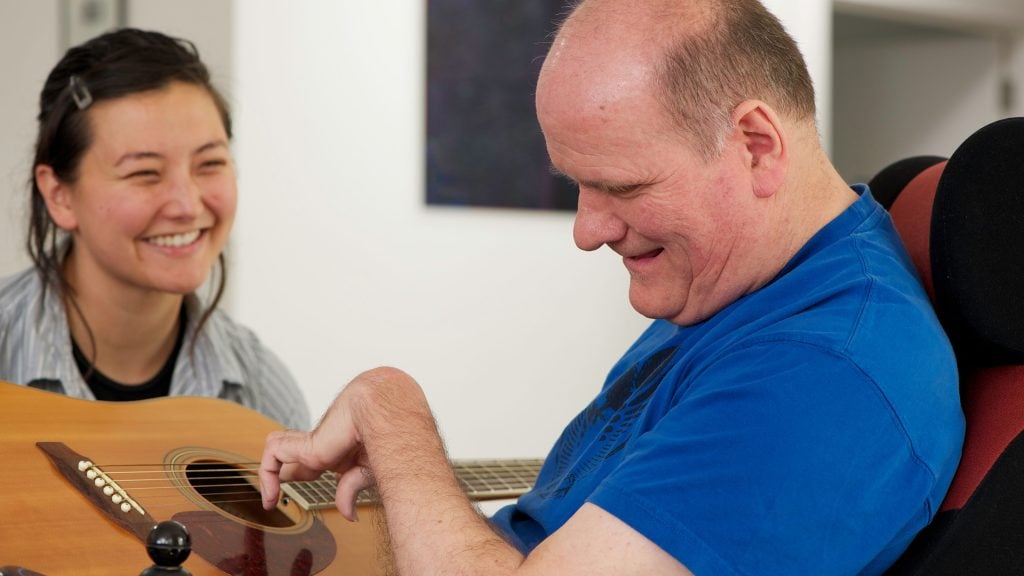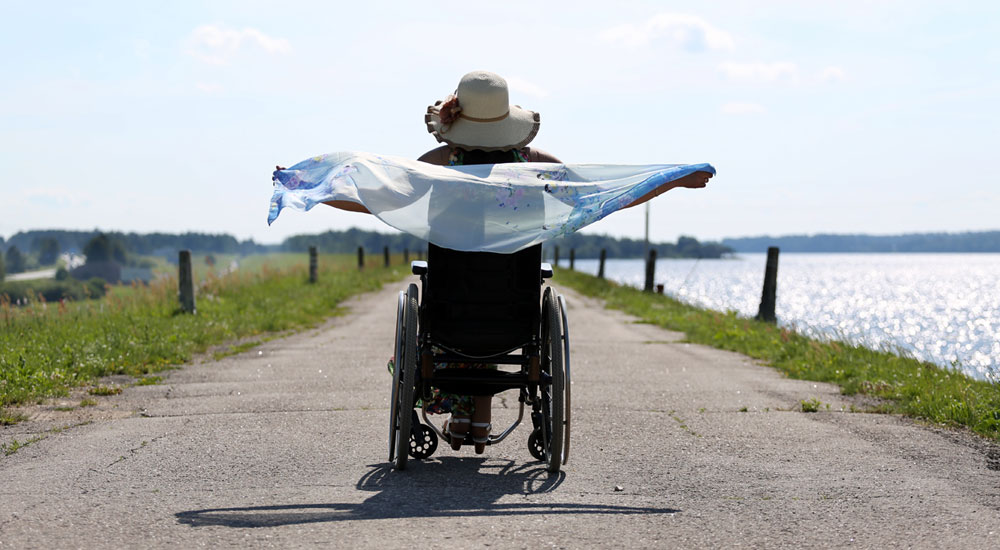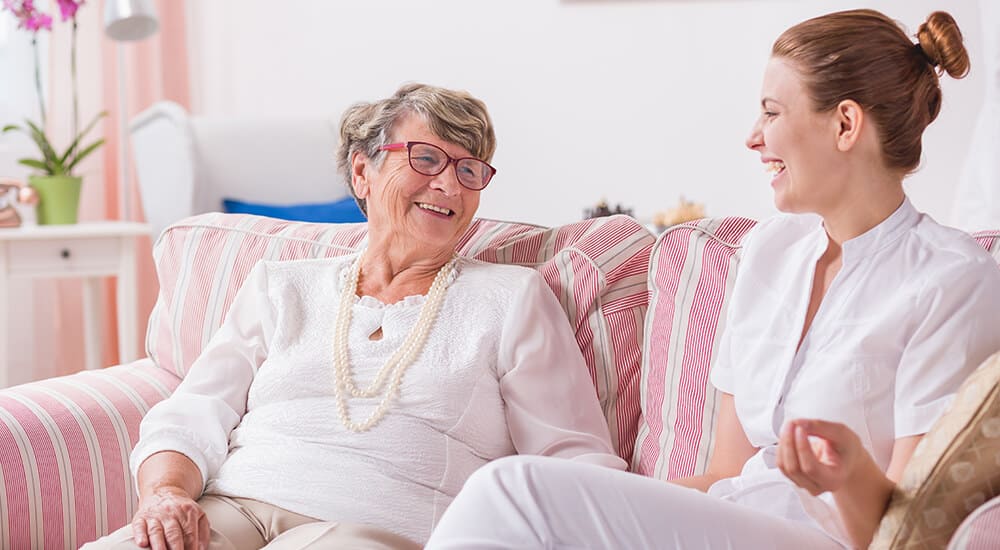It’s no secret that enjoying a range of leisure activities can help improve our happiness and wellbeing. Most of us, throughout our life, enjoy getting involved in one activity or another. Those activities may change at different stages in life and we also often come across something we might like to try but for one reason or another don’t get round to or think it might be too difficult. Sometimes we’re not quite sure if we’d enjoy something or don’t really know what we’d like or what might be suitable for us!
Thankfully, as society is becoming more aware of our differing physical, mental, and functional capacity, engaging in activities is no longer necessarily a one size fits all scenario. Increasingly, organisations are catering to all abilities and preferences so that we can all enjoy an active and fun lifestyle.
Day Program Activities for Adults with Disabilities
From the expressive world of arts and crafts to the harmonious notes of music therapy, from the exhilaration of adaptive sports to the therapeutic joys of gardening, there are a myriad of activities that celebrate the uniqueness of every individual.
The activities one can do during daytime are plenty and creative. Specific activities can vary based on individual needs and program goals, but here are some common day activities that anyone can enjoy that aren’t too strenuous.
Gardening
Men or women, young or old, gardening is something many of us enjoy doing during our leisure time. Witnessing your hard work and sweat blossoming gives an indescribable sense of achievement – a huge boost to the mental and emotional health.
A sensory-rich experience that stimulates touch, sight, and smell, the act of planting, nurturing and harvesting promotes fine and gross motor skills development while the rhythmic and repetitive nature of gardening has a calming effect that reduces stress and anxiety overall. For adults with intellectual disabilities, gardening can actually help with enhancing cognitive abilities through tasks like identifying plants and understanding growth cycles.
If this sounds like something for you, consider joining your local or neighbourhood gardening community/club so that you can exchange knowledge and experience with one another – anything becomes more fun if you do it with someone else!
Adaptive Fitness / Seated Exercise Classes
Physical exercise is important for activities during the day. Exercise makes you stronger, more flexible, and improves your heart health, which are benefits everyone knows about. But just taking part in exercise can also help you feel more connected to others and improve your social life, which is great for everyone. It helps reduce feelings of being alone, which makes you feel better mentally and emotionally, giving you a happier view of life.
For people with physical limitations, adaptive fitness lets them still get the benefits of exercise. This includes exercises you can do while sitting down, like aerobics or dance classes for those in wheelchairs. These activities help improve balance and coordination, making it easier to move and stay flexible. For those who often feel chronic pain, there are also classes with gentle movements to help reduce this pain.
Accessible Yoga and Meditation
If working out isn’t your thing, think about trying yoga and meditation that are easy to do. They include simple poses, stretches you can change to fit your needs, and breathing exercises. These activities help make you more flexible, relaxed, and less stressed. They are also designed so people with different abilities can do them easily and comfortably.
Meditation, tailored to different abilities, provides a mental sanctuary that fosters inner peace and emotional wellbeing. Both yoga and meditation empower individuals to connect with their bodies, manage stress, and cultivate a positive and mindful approach to life, which explains their continued surge of popularity in the community.
Community Outings
Activities do not have to be exercise-related only – mere outings to community places such as parks, museums, libraries, or even shopping centres are activities themselves that one can enjoy during daytime. Going out and explore new environments and engage with the broader community helps stimulate cognitive growth and sensory experiences. These in turn contribute to skill development such as using public transportation and navigating public space.
Community Volunteering
Volunteering is amazing because it helps people feel like they have a purpose, feel good about themselves, and connect with others. Whether you’re helping with local events, environmental work, or helping people in need, you can really make a difference and show off your skills. This helps change how people think about each other, making communities more welcoming for everyone.
It’s not only the people you’re helping who get something out of it. Volunteering can also boosts your confidence, helps you be more independent, and improves your life through making social connections.
Accessible Outdoor Adventures
There are many outdoor activities that are made easy for everyone to join, like hiking trails that are good for wheelchairs, parks and beaches you can get to easily, beach wheelchairs, water sports that have been adapted, and trips to botanical gardens. These activities help people enjoy nature and have exciting experiences in a helpful setting. They’re great for both physical and mental health and make people feel more in control of their lives, while also teaching important skills.
Indoor Activities
For those looking for activities that can be pursued within the comfort of controlled environments (indoors), here are a few suggestions where the same exploration of interests, creative pursuits, and sense of community can be achieved:
Art and Craft Sessions
Painting, drawing, sculpting or other hands-on projects are perhaps the most popular indoor activities. They let people show their feelings and experiences in a visual way, no matter how well they can speak. Making art helps people express themselves, feel proud and valuable, and at the same time improves movement skills, coordination between what they see and do, and thinking abilities.
Other craft activities include:
- Textile arts i.e. quilting, embroidery, knitting
- Decoupage i.e. decorate surfaces by adhering cut-out paper or fabric designs and sealing them with varnish
- Origami
- Beadwork
- Candle making etc.
Music and Dance Therapy
Music therapy and dance therapy are great ways for people to connect with others and build a community. In music therapy, people get to play with rhythms, melodies, and instruments, while dance therapy lets them move to improve their fitness and coordination. Both these activities help people think better and feel emotionally connected. They offer a way for people to feel free and in control, acting as a healing outlet.
Reading and Storytelling Sessions
Reading and telling stories are activities that help a lot with how we think, talk, and feel. Many people love doing this when they have some spare time. For those who have trouble seeing or thinking, these activities offer a way to discover new worlds and ideas using things like braille, audiobooks, and interactive storytelling.
Telling stories together creates a friendly and engaging space where people can connect with others and feel part of a community. Reading, whether it’s with books you can touch, stories that involve your senses, or using special technology, allows people to share their own stories, connect with different stories, and enjoy the fun of storytelling.
Calligraphy Practice
Doing calligraphy, which is the art of making beautiful letters and designs, is a fun activity you can do inside. It can be adjusted for people with different physical abilities and encourages everyone to be creative and try out art. Making these lovely letters and designs can make you feel proud and good about yourself. The carefulness and attention needed for calligraphy also help improve your hand movements, how well you can coordinate your eyes and hands, and your ability to focus.
Educational Workshops
For individuals looking to learn or develop other skill sets, joining an educational workshop will be an enjoyable experience. From vocational skills to life skills to academic subjects, there is a good variety of workshops out there offering people the learning pathway to acquiring knowledge and practical abilities. Through the addressing of specific needs and adapting teaching methods, these workshops promote lifelong learning and active participation in various aspects of their life, thereby contributing to the overall personal and professional growth of an individual.
Fun Activities for Adults
While all the above activities are of an enjoyable nature, here are a few extra-fun ones for those in seek of something ‘more’:
Adaptive gaming
Video games – that sounds like fun already. Adaptive gaming involves modifying games and gaming setups so that people of diverse abilities get to engage in the fun, ensuring accessibility for all. By modification, we’re looking at adaptive controllers, customisable settings, alternative input methods and the likes so that individuals with physical, cognitive, or sensory impairment can participate in gaming experiences that are tailored to their unique needs.
Amongst other benefits, adaptive gaming stands out as a means that break down barriers for individuals with disabilities to connect, compete and enjoy the immersive world of gaming.
Games and recreational activities/Adaptive simulation
If video games are a bit too exciting for you, puzzles and board games are a calmer option that still lets you have fun with others, challenge your brain, and enjoy some friendly competition.
Also, for those who can’t join in activities like wheelchair basketball, wheelchair tennis, or adaptive cycling, virtual reality or gaming simulations offer a way to experience these sports inside. This means you can still enjoy playing sports, just in a different way.
Culinary activities
If you’re not into games and sports, cooking classes or activities that involve making meals can be a fun and welcoming way to be creative. You can learn useful skills and enjoy the experience of cooking or baking by doing things like cutting, mixing, and measuring ingredients. These activities help you become more independent and feel proud of what you’ve made. You can change recipes and tasks to match what you’re able to do. Cooking lets you enjoy food in a new way, and being in the kitchen, which is full of different smells, textures, and tastes, also helps you explore your senses and keeps your mind active.
Sensory rooms
Exploring through our senses is something that’s encouraged for everyone, especially during the early developmental stages in life. For adults with autism, sensory processing disorders, or other disabilities, playing in ways that engage their senses is even more important. It helps them get better at paying attention, focusing, and feeling emotionally well.
Sensory rooms are special places designed just for this purpose. They are set up to meet specific sensory needs, offering a therapeutic space with features like soothing lights, tactile surfaces, calming sounds, and interactive features. These rooms are great because they can be adjusted to fit what each person likes, helping adults with disabilities explore their senses in a safe way, control how much sensory information they’re getting, and feel less stressed.
Here are some sensory play ideas tailored for people with disabilities to consider:
- Water play: engage in water activities be it playing with floating toys, splashing in a shallow pool, or exploring water textures
- Sensory bins: create bins filled with materials like rice, beans, or sand for tactile exploration. Hide objects for a sensory treasure hunt
- Playdough and clay: mold and shape playdough or clay to enhance fine motor skills
- Bubble wrap painting: combine the sensory delight of popping bubble wrap with the creativity of painting
- Scented play: introduce scented elements like scented markers, aromatherapy playdough, or scented bubbles for olfactory
Benefits of Keeping Active
Engaging in regular physical activity offers tons of benefits for individuals. It helps make your body stronger and more flexible, and it’s great for your heart. It can also make you feel better mentally by lowering stress, anxiety, and depression.
But there’s more to it than just being physically and mentally healthy. Being active also helps you feel like you belong by taking part in community activities. You can make friends and feel less alone, which helps you feel more independent and confident.
A lot of people know that being active is good, but what they might not realise is that getting involved in local events, volunteering, or joining clubs lets you share your special skills and views with others. This helps reinforce a sense of purpose and value.
Seeking Help to Facilitate These Activities
There are so many different activities out there for everyone to try and enjoy. You just need to find the one that suits you best.
Absolute Care & Health is a reliable Registered NDIS service provider. We stick to the NDIS Price Guide for all our services and assist you in reaching the goals in your NDIS plan.
Contact us today if you’re searching for an NDIS service provider.



